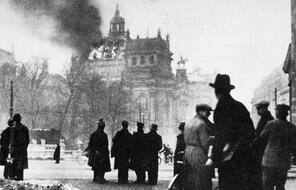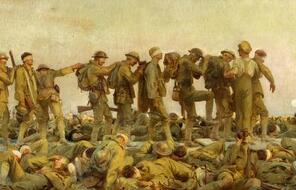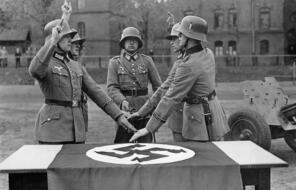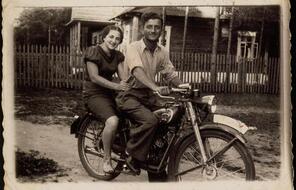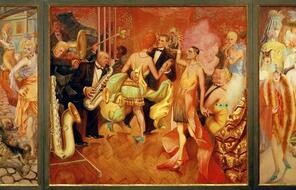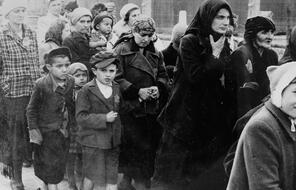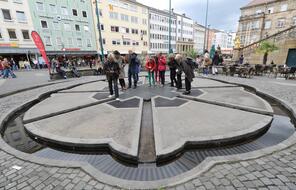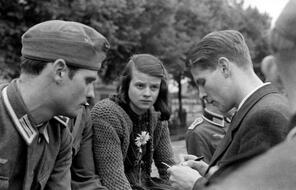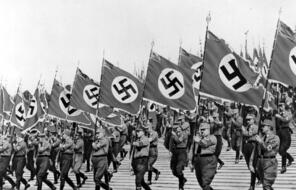The Birthday Party
In 1938, writer Erika Mann published a book called School for Barbarians: Education Under the Nazis. The daughter of Nobel Prize–winning novelist Thomas Mann, she had emigrated from Germany to the United States in 1937. Her book was written as an indictment of the Nazis’ efforts to shape young people. Here, she tells what happened when the parents of a 12-year-old boy celebrated his birthday.
They gave him a birthday party, with ordinary, normal, “civilian” presents: a paint-box, a picture puzzle, a shining new bicycle—and lit twelve candles on his birthday cake. How they looked forward to that party! And it went off like a political conference. Six boys had been invited, and five of them came right on time.
“Who’s missing?” the mother asked.
“Can’t you see?” said the boy, “HE’s missing—Fritzekarl!”
“What a pity!” she answered. That it should be just Fritzekarl. Two years older than her son, he was the leader in the Jungvolk, and his presence at the party was of great importance. If he did not appear, it was a sign of disfavor; the whole thing would be spoiled.
The boys, in their Hitler Youth uniforms, stood around the birthday table, not knowing quite what to do with the toys. The bicycle pleased all of them, with its bell (which they took turns ringing) and its rubber tires, which were so hard to get nowadays, and which the father had finally been able to obtain after using all of his contacts in the Party, paying a high cash price, and emphasizing the fact that this was a wheel for a boy, a Jungvolk boy, and not for a girl who would never go to war! Now it stood there, complete with instructions and a copy of the German Cyclist, saying, “Boys on bicycles must try to remember the names of towns, rivers, mountains, and lakes as well as the material and type of architecture of bridges, etc. They may be able to make use of this knowledge for good of the Fatherland.”
The bell rang, and the son dashed to the front door. A sharp voice came through, crying “Heil Hitler!” and the five boys at the table turned on their heels as the answer came in a voice already breaking, “Heil Hitler!” Their superior officer was received with the “German salute,” five hands raised, great composure, solemn faces. Solemnly, Fritzekarl gave the host his birthday present—a framed photograph of the Leader of the Reich Youth, Baldur von Schirach, with a facsimile autograph. The son clicked his heels as he received it.
“I wish to speak to your father,” Fritzekarl said curtly.
The mother answered in her friendly voice, “My husband is not free just now—he’s upstairs working.”
Fritzekarl attempted to keep the note of military command in his shrill young voice. “Just the same, madam, I should prefer to speak to your husband for a moment . . . in the interest of your son.”
His manner was correct, in spite of his tone. He bowed slightly to the mother as he finished his masterful little speech.
“Fourteen years old!” she thought, “but the mechanism of power backs him up and he knows it.”
The son was blushing violently. “For goodness’ sake call him!” he said, stepping toward his mother.
The father came down at once.
“Heil Hitler!” cried Fritzekarl.
“Heil Hitler!” repeated the man. “What can I do for you, Lieutenant?”
“Pardon me,” says Fritzekarl, who doesn’t get the joke, and retains his martial stare, “but your son was absent from our last practice exercises. . . .”
“Yes I know,” the father interrupts at this point, “he had a cold.”
“It was at your suggestion that he absented himself,” Fritzekarl continues, his voice breaking and going hoarse over the phrase. “You wrote me some sort of excuse, to say that he was staying home at your wish.”
The father put his weight first on one foot and then on the other. “As a matter of fact, it is my wish that he stay home when he has such a severe cold.”
“Oh, I didn’t have such a bad cold at all,” the son breaks in. He is leaning on the handlebars of the bicycle that his father had to fight for. “I could have gone, perfectly well.”
The man looks at his son, a long look of surprise and pain and the resignation he has learned. “Well,” he says, and moves toward the door.
But Fritzekarl stops him. “A moment, please,” he insists, but politely. “Your son was in school on that day and the following day. So he cannot have been really ill. Let me call your attention to the fact that he should have been present at practice and that it is my duty to report the absence!”
“Oh, please—” the boy was speaking for his father, quickly, bargaining, “don’t do that, please? It won’t ever happen again—will it, father?—really, never again!”
The father wanted to protest; he felt the despairing look of his wife, the outrage and embarrassment of the scene. “How dare you speak to me like that!” was what he was repeating in his mind. But he knew the consequences of such an argument, for himself, and for his son. Even if he could convince the Nazi authorities of his own part, and Fritzekarl’s rudeness, his son would still have to face the Jungvolk, paying for his father’s moment of “courage.” And so he only said, hesitatingly and stiffly, “No—it certainly will never happen again!”
“I thank you,” replied the fourteen-year-old superior of the treasonable son. The father was dismissed.
He cannot air his resentment; he has to expect eavesdroppers and spies everywhere. His wife tells their son everything—not out of malice, but in the mistaken hope of reclaiming him this way. And the new maid is a person to be feared. She listens at doors, reads everything that’s lying around the house, and she happens to be having an affair with a Blockwart [block warden]; he could destroy a family single-handed. The boy would hardly denounce his own father, the man reflects, but if he repeats some remark to the maid, she will run to her Blockwart, the Gestapo (Secret State Police) will have it right away, and the doom will begin to move on them. Or, if they decide to dismiss the maid, her vengeance hanging over their heads may even be worse. 1
Click below to listen to an audio version of the reading
- 1Erika Mann, School for Barbarians: Education Under the Nazis (Mineola, NY: Dover Publications, 2014), 32–35. Reprinted by permission from Dover Publications.
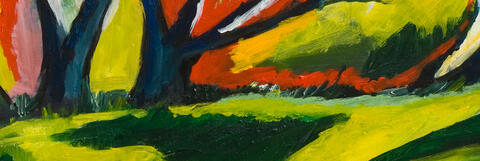
Connection Questions
- What does this reading add to your thinking about why young people may have been enthusiastic about belonging to the Jungvolk, Hitler Youth, or other Nazi youth organizations?
- After reading this story, a boy said, “This is like a world upside down—the children have the power.” Do you agree? Did the children really have power? If so, what was the source of their power?
- The boy’s mother hoped to “reclaim” her son. How was he lost? The father wanted to protest but feared the consequences. What might have been those consequences? What did he mean when he thought that his son would have to pay for the father’s “courage”?
- Why does the son contradict his father and insist that he could have gone to the Jungvolk meeting? What is the role of the particular historical context in his choice? What role do peer pressure and the desire to fit in play?
Get the Handout
How to Cite This Reading
Facing History & Ourselves, "The Birthday Party," last updated August 2, 2016.


